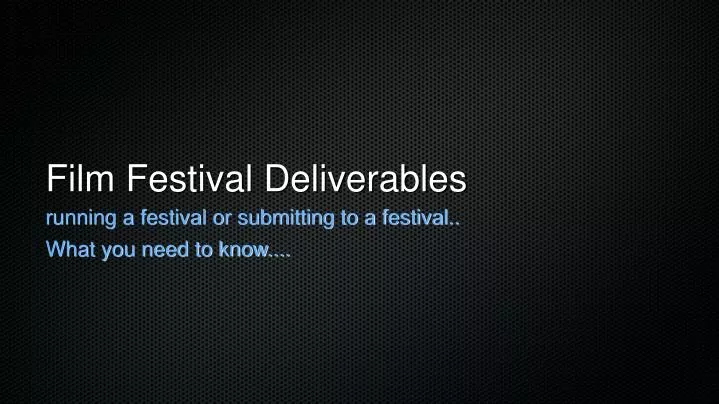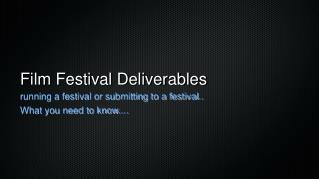
Film Festival Deliverables
Presentation Transcript
Film Festival Deliverables • running a festival or submitting to a festival.. • What you need to know....
What is covered • The typical media formats you expect today. (Tapes, files, film, DCP) • How to run a festival cost effectively • What a film producer needs to know(How to take advantage of digital) • What a film festival producer needs to know(Best practices for the digital age)
Typical media formats • Film - Outdated, no longer preferred • DCP (Digital Cinema Package) - preferred but limited to 24fps for Interop DCPs which is the only widely supported DCP type(Note: SMPTE DCP support is coming this year (we hope)) • Tapes (HD and SD, SR/HD/Digibeta-cam, HDV) - Still in common use especially when non 24fps content is involved (Fading fast) • BluRay’s and DVDs common again for non 24fps content (Quality??) • eCinema (Non DCP media files) - Via USB thumb drive, HardDrive or Internet in a plethora of formats from MPEG2, H264, ProRes etc)Other then DCP, this would be the best method. (4:2:2 in 8/10bit) • IP or Internet delivery possible with eCinema
Doing a Festival cost effectively • Ask for DCPs. Try to utilise a location that plays SMPTE DCP’s • Otherwise prioritise content,eCinema, BluRay/DVD, Tape (If available) • Play all media files from a single platform, Windows Laptop. • dcpPlayer - DCPs (Inc SMPTE any frame rates)BluRay Drive and software - Any BluRay or DVDeCinema files any format - VLC media player will play all • i7 Laptop with BluRay, dcpPlayer and VLC software • Projector and Audio options
What a film producer should aim for • Will always need to make BluRay and DVDs for promotion • DCP still BEST for in Cinema display. Best quality, similar or better then 4:4:4 12 bit (Highest quality ProRes equivalent) • How to get to DCP? • What to Supply (Video files,audio files and subtitles) • Colour Management difficult. Talk to Encoder • Remember DCPs are 1998x1080 or 2048x858, master to suite • Is Encryption needed? If so, becomes much more difficult ($$$)
What a film producer should aim for(When doing it on the cheap) • eCinema networks in different regions.For example Australia, New Zealand, India and Nepal. • eCinema cheaper to make and distribute then DCP.(Smaller files, small USB-Hard Drives, small enough to download) • In some regions, eCinema is the only way. For example, non-English, mainly Local content regions. • eCinema can archive 4:2:2 (8 or 10bit) Quality, better then BluRay. • eCinema files can be downloaded over Internet (DCI to big)
How to get a DCP, eCinema, BluRay • Open source tools are available but do not recommend to use them unless you really know what your doing • Avoid using bedroom encoders • If possible go to a specialised DCP encoding facility • Good facilities have DCI/eCinema players for testing and quality checks but this would likely ad to the cost (Consider this insurance. Can you risk sending out 50 BAD copies $$) • I cannot stress, if you can afford it, get your content encoded by a company who knows what they are doing (Avoid problems and egg-on-your-face if it goes wrong or does not look 100%)
What to supply an encoding facility • TIF image files in 16bit liner color space • Master quality codec files such as ProRes MOV files • Typical colour space such as REC709 (Problematic area) • DPX files are also typical buy make sure you tell the encoder exactly how they are stored. (Colour space can be linear or logarithmic) • Audio files as separate stems meaning a mono 48Hz 24bit audio file per channel, typically 6 channels for 5.1 surround • TALK TO THE ENCODER and see what he can deal with
Color Management • This is a very difficult area and is easy to get wrong • Typically this is REC709 (If your doing the typical Video workflow) • Especially important if doing DI using DPX and other more then 8bit color workflow. • If not sure, best to bring in Encoder company to look at your workflow as so they can work out the best method • In general, a good editor or workflow consultant should understand this (Tho I have seen many who do not)
Scope or Flat • the DCI standard for DCPs are to master to SCOPE or FLAT • SCOPE = (2K) 2048x858 or (4K) 4096x1716 (2.39:1) • FLAT = (2K) 1998x1080 or (4K) 3996x2160 (1.85:1) • FLAT Similar to HD 1920x1080 • Common workflow is to use typical HD workflow then do resize of 1920->1998, loose small amount of top and bottom • Any resize has quality issues, you should be aware of this (Ie Avatar used 1920x1080, did you notice)
Encryption needed?? • We all want to protect our content • DCI supports encryption that requires a KDM or key to be generated for every screen you could possibly want to show the DCP • THIS IS EXPENSIVE - Every key cost $$ to produce • Must go to specialised key management companies like Technicolor or Deluxe (And others) • THIS IS EXPENSIVE and you should only consider this if you have a high profile independent feature or better, otherwise it is probably unjustified • eCinema can also support encryption but this is usually a proprietary solution based on the region and distribution companies
Festival Producers, whats best for you • SMPTE-DCPs are now the way to go • SMPTE-DCPs can be made at all frame rates • tools such as dcpPlayer can be used to preview/quality control the content without the need to rent a cinema • All Cinemas doing festivals are Digital now, just need to make sure they are upgraded to SMPTE-DCP • Cinema Owners take note, get SMPTE-DCP upgrades ASAP, available now but check how compatible your equipment is with all frame rates (May need to purchase up-to-date player/projector)
Thanks for watching CineTechGeek • James Gardiner • www.cinetechgeek.com


















